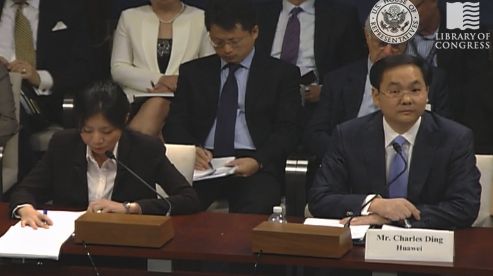Huawei and ZTE butt heads with US House committee
Chinese telecom companies take on lawmakers' skepticism

Sign up for breaking news, reviews, opinion, top tech deals, and more.
You are now subscribed
Your newsletter sign-up was successful
Executives from two Chinese telecommunication companies testified before the House Intelligence Committee Thursday about possible threats they pose to national security if they enter the U.S. technology market.
After questioning the top brass of Huawei and ZTE for three hours, committee members didn't appear satisfied with the execs' answers.
"I can say that I am a little disappointed today," committee chairman Mike Rogers (R-Mich.) reportedly said at the end of the session. "I was hoping for a little more transparency."
The committee is at the end of a nearly year-long investigation of the two companies after several attempts by the Chinese telecomm giants to do business with the U.S. tech industry.
However, there are concerns that they might provide the Chinese government an opportunity to spy on American businesses and "threaten our critical infrastructure, or increase the opportunities for Chinese economic espionage," the House panel said in a notice about the hearing.
Standing up to the Chinese government
During Thursday's hearing, lawmakers pressed the execs repeatedly about how the two companies would stand up to pressure if the Chinese government wanted access to their customer data.
Huawei's Senior Vice President Charles Ding took most of the heat as the congress members turned their gaze on the world's second-largest telecom gear vendor.
Sign up for breaking news, reviews, opinion, top tech deals, and more.
"How will you deal with your Chinese government if they order you to give information about your customers in the United States?" C.A. Dutch Ruppersberger (D-Md.) asked during the course of the hearing.
"We have never, nor will we ever, harm the networks of our customers," Ding answered through an interpreter. "This would be corporate suicide."
"Even if it meant you would go to jail?" Ruppersberger said.
"Why would the company put us in jail?" Ding responded.
Though much of the hearing's focus was on Ding and Huawei, ZTE's Senior Vice President Zhu Jinyun was also called to defend his company, which happens to be Huawei's closest Chinese rival.
Representative Sue Myrick (R-N.C.) bombarded Zhu with questions regarding allegations ZTE destroyed documents and ferreted away evidence pertaining to sales of equipment to Iran, long viewed as a country posing a serious security risk to the U.S.
"We are actively cooperating with the U.S. government investigation to get to the bottom on this," Zhu responded through an interpreter.
"You are not answering my question," Myrick replied.
"We would never do something like that," Zhu told the committee.
'Allegations based on allegations'
But it looks like U.S. lawmakers aren't the only ones frustrated by the situation.
Huawei published an 81-page paper Wednesday night called "The Case for Huawei in America" harkening back to Cold War McCarthyism, channeling journalist Edward R. Murrow in the report's front cover.
"No one familiar with the history of this country can deny that congressional committees are useful. It is necessary to investigate before legislating, but the line between investigating and persecuting is a very fine one," the paper quoted.
The report says U.S. concerns about the company are unfounded and are "allegations based on allegations" with no substance.
Huawei's repeated attempts to enter the U.S. tech game have reportedly been thwarted many times over the years.
In 2008, Huawei and Bain Capital Partners had to shelve a bid for computer-equipment manufacture 3Com Corp after the Treasury Department's Committee on Foreign Investments objected to the sale.
Then in 2011, Huawei was forced to drop plans to buy computer service company 3Com Corp after more problems with the Treasury committee.
The paper also warns if Huawei is unable to enter the U.S. market it would have "adverse implications" for U.S.-China relations far beyond the tech giant.